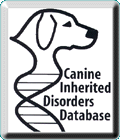
What is a genetic disorder?
Most diseases are affected to some extent by both genes and the environment. A genetic disorder is one in which an abnormality in the genetic make-up (the genome) of the individual plays a significant role in causing the condition. Although some disorders occur because of spontaneous mutation, many genetic disorders are inherited. These conditions are seen quite often in dogs, mostly but not exclusively in purebreds. These situations are often heart-breaking because the dog is generally a well-loved family member by the time the condition is apparent and has been diagnosed by a veterinarian.
The role of genes in disease
The role played by genes in disease is becoming better understood. Genetic factors are involved to a greater or lesser extent in congenital malformations (conditions with which an animal is born), metabolic disorders, disorders of immune function, disorders associated with aging, and cancer. These categories of disease have become relatively more important as infectious, parasitic, and nutritional diseases have become less common due to vaccination programmes and advancing knowledge about nutrition, treatments and diagnostic methods.
How to reduce inherited disorders
The frequency of inherited conditions can be reduced through good breeding practices. For this to occur, we need to know how the disease is inherited (the mode of inheritance), how to identify the condition as early as possible, and ways to recognize carriers of the disease who, except in the case of autosomal dominant traits, are not clinically affected.
For many of the disorders that are believed to be inherited, the specific pattern of inheritance has not been established. Breeds that have an increased risk for a condition, relative to other dog breeds, are said to have a breed predisposition. Preferably, affected dogs and their close relatives should not be used in breeding programmes.

